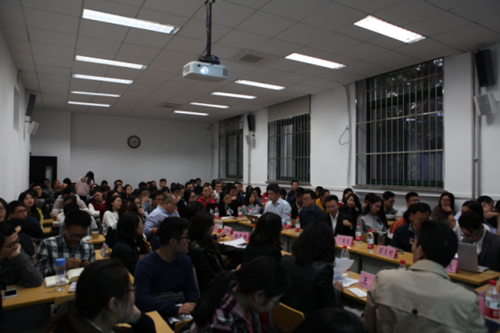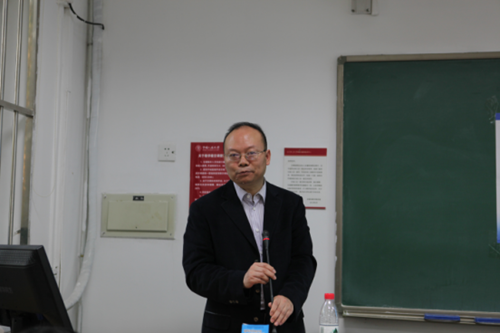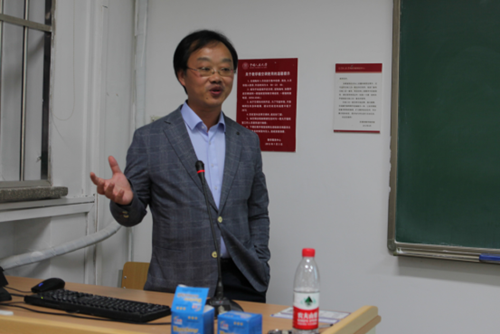Prof. Zheng Ge Gave a Speech on the Frontier Forum of RUC Law and Technology Institute: Artificial Intelligence and the Future
time:2017-10-13On October 13, 2017, invited by RUC Law and Technology Institute (RLTI, also known as the Future Rule of Law Institute), Zheng Ge, the professor of Koguan school of law in Shang Hai Jiaotong University, gave a speech whose topic was Artificial Intelligence and the Future of Law on the frontier forum. This forum was attended by the following:Prof. Wang Yi, the dean of law school of Renmin University, Prof. Zhang Xiang, the associate dean of law school of Renmin University, associate professor Zhang Jiyu, associate professor Wang Ying, associate professor Guo Rui, the chief procurator of No.2 Branches of the Beijing Municipal People’s Procuratorate Miao Shengming, the associate professor of Tsinghua University Liu Han, assistant professor Liu Nan, assistant professor of Beihang University law school Yu Shengfeng, associate professor of Peking University Electronics Engineering and Computer Science School Qu Tianshu, lecturer of Peking University Zuo Yilu, and hundreds of students and persons from practice field. It was hosted by associate professor Ding Xiaodong.

At first, Prof. Wang Yi addressed this forum. In his speech, he reviewed the establishment of the future rule of law research institute and its series of activities. He pointed out that the world has gave a chance to both China and the Chinese jurists since the first industrial revolutionary, which made us be qualified to equally dialogue with others and use our jurists’ wisdom to benefit the whole human civilization.

Then, in warm applauses, Prof. Zheng Ge began delivering the keynote speech titled Artificial Intelligence and the Future of Law.

Prof. Zheng said, artificial intelligence (AI) was not a question in an only single area. Instead, it had a deep influence on our life from daily affairs of clothing, meals, houses and transportation to the economy and culture of the whole country. He firstly talked about an anecdote he had read and explained the AI from the angle of human development, concluding that AI is the inevitable product of modern industrial civilization. Subsequently, he divided AI into two parts: synthetic intelligence and artificial labourer, and then introduced their own exemplifications in life. After introducing related background knowledge of AI, he discussed the relationship between AI and Law, saying that AI would have a great impact on legal profession, legal thinking and legal concept. He claimed that in the area of legal concept the impact would firstly occur in the constitution, which could change the basic political and social system regulated by the constitution. What’s more, “AI causes a polarized society with making the inequality of society much worse”, he said. The law lagged behind the technology, usually marking that the law would stabilize the first comers’ monopoly position and restricting the following. Meanwhile, the development of AI has gradually blurred the line between private rights and public rights. As a result, the target supposed to be regulated by government has become its partner and even those in power. By analyzing the big data, companies with AI can imperceptibly influence consumers’ behavior, governments’ decision-making behavior and even legislative acts, meaning that we are evolving into the age of algorithms rather than the age where people are ruled by the law. Afterwards, Prof. Zhang talked about the effect of AI on legal regulation mode through related cases of American financial industry, and on the legal professions in these processes such as electronic forensics, litigation management and the drafting and checking of contract. Regarding these problems, he believed that it was not feasible for the law to give AI legal personality, for in whatever manner the responsibility was assumed by robots, it would finally fall on human himself. Besides, he compared their advantages and disadvantages of the legislation modes of the USA and German in the field of autonomous vehicle. At last, to make the law more intelligent in coping with AI, he mentioned four directions: firstly, the top design should be enhanced with drafting the constitution of AI society; secondly, the government should invest more to attract talents to legislation, administration and judicature; thirdly, the industry standards, public interest and protection for individual rights should be put into comprehensive consideration in line with these procedurals like public participation and hearing; fourthly, the rules should be made to restrain the behavior of algorithm designers referring to the thought of German in making ethic norms for autonomous vehicle design.
When Prof. Zhang Ge finished his speech, the host associate professor Ding Xiaodong made a brief summary. Starting with the debate about AI in American law circle, Prof. Ding pointed out that on one hand, since the feature of fracture, AI required the innovation on legal regulation mode; on the other hand, the basic principles of law were unchanged and that law and ethnics were embedded into the development of AI and technology asked for the law’s positive responses.

After the speeches, guest speakers gave their own simple ideas on this topic. Associate professor Guo Rui talked about the shock AI has cast on the whole society as well as human ethnics and behaviors, and about the relationship between AI and law. Focusing on whether the legal personality should be conferred on AI, teacher Lu Nan said judging whether a body has the legal personality in the law was not easy and he also talked of the impact AI has had on basic legal areas from the angles of legal body, the content of right, the redefinition and value ascertainment of property, social organization and legal inference. Teacher Zuo Yilu analyzed the effect of AI from two aspects-the concept and regulation of AI. Beginning with the case of Linkedin VS hiQ Lab, teacher Yu Shengfeng said that traditional legislation, administration and judicature had trouble in dealing with related problems in this area and he provided two kinds of thoughts: firstly, the politic structure of separation of powers should be established in the area of internet; secondly, the question should be considered from the scopes of nomology and legal philosophy. Next, with advertence to the attitude jurists should take towards AI, associate professor Wang Ying told that jurists should be cautious about the legal personality and legal burden of AI, trying to use code and law to make up the future. Teacher Liu Han through introducing the concept of AI, relationship between AI and enactment as well as the influence of AI on legal education, concluded that AI needed the inference and judgment of jurists. Lastly, from the perspective of a technician, teacher Qu Tianshu asked three questions: first, can the development of technology help to find the real subject of legal responsibility? Second, should the technicians shoulder the burden related to the behaviors of robots which are not under the control of technicians? Third, should robots undertake the burden for their own conscious behaviors?
Subsequently, Associate professor Zhang Jiyu summarized and commented on this forum. First of all, she expressed gratitude for Prof. Zhang’s wonderful speech, and then centering on what AI does with the law of intellectual property rights, she presented the view that to some extent, AI would have beneficial effect on the law of intellectual property rights, considering from the aspects of the whole legal system, legal research method, legal application, etc.
In the end, Prof. Zhang answered these questions asked by the presented audiences and made some brief comments on the ideas shared by guest speakers. At 6pm, this forum ended in warm applause.
(Editor: Luo Man)
reading:
In the previous:The 91st Professor Salon- Professor Liu Pinxin and the Justice with Big Data and the Modernization of the Rule of Law in China.docx The next article:"Scientific and Technological Revolution and Development of Labor Law - Frontier Issues of Labor Law Across the Taiwan Strait" Seminar Was S
